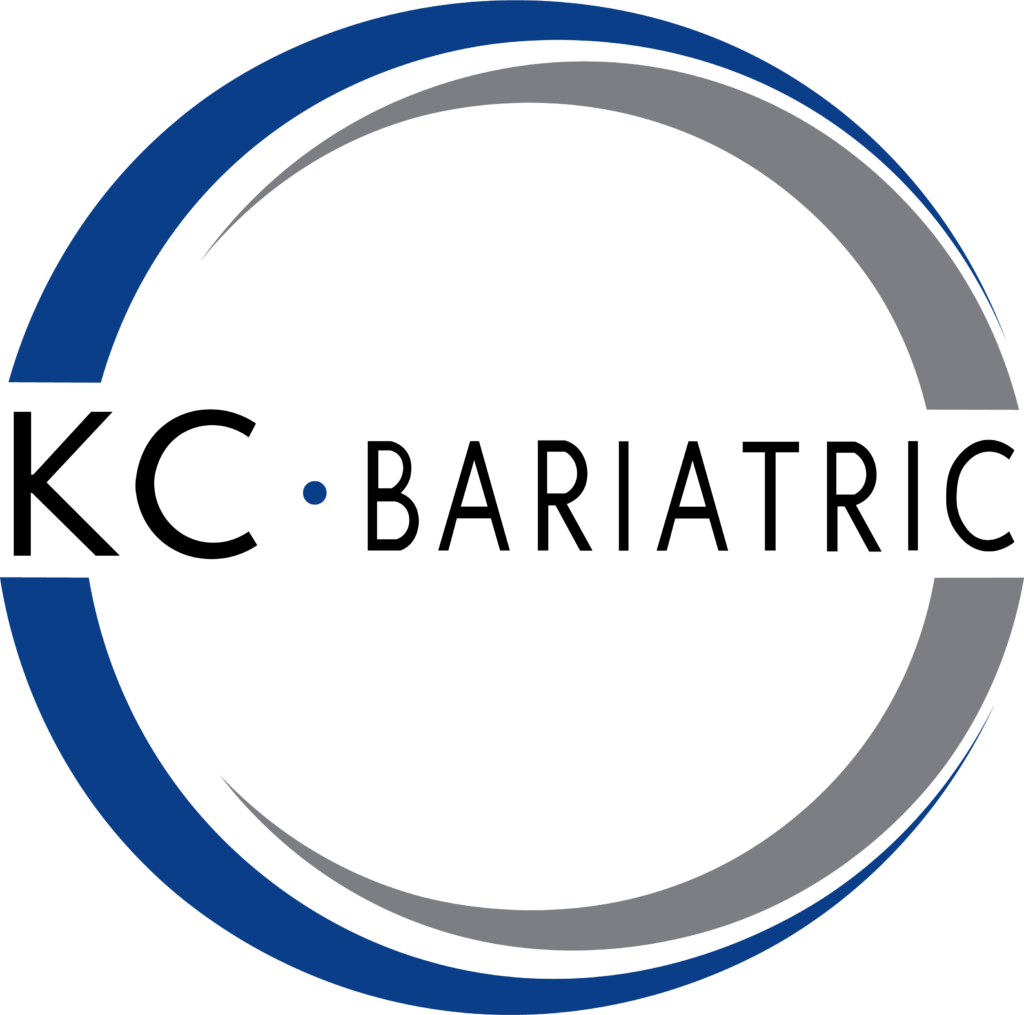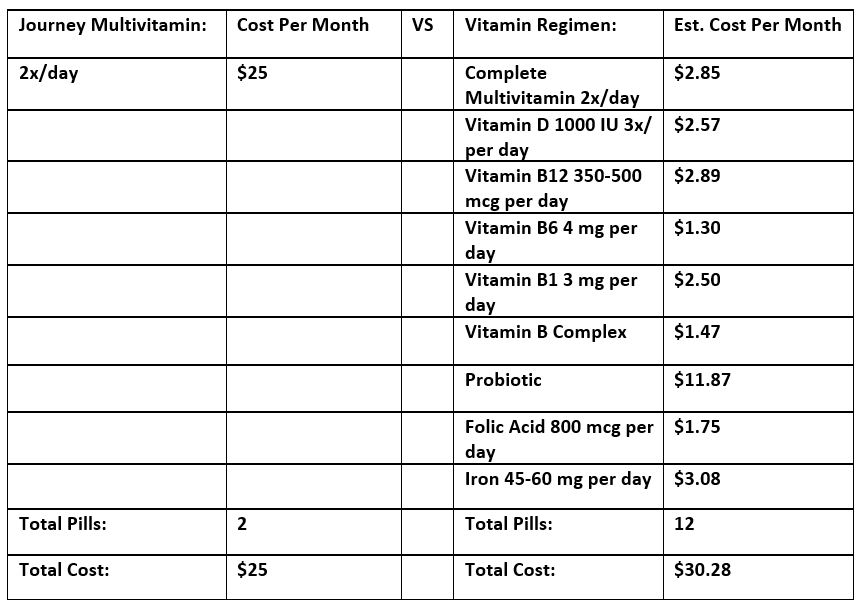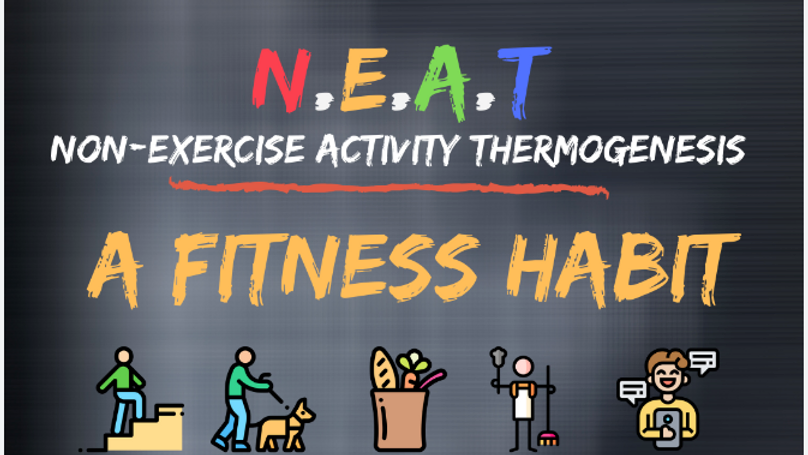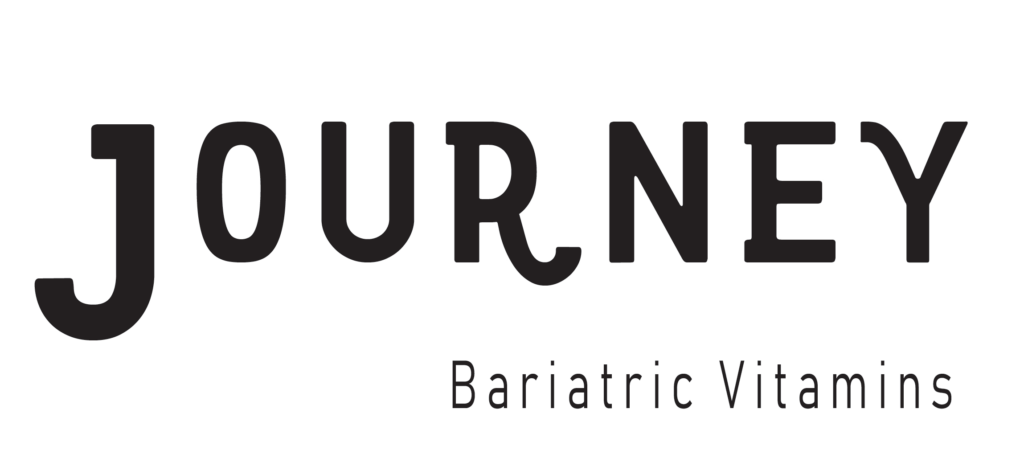Many vitamins and minerals are essential for complete and balanced nutritional health. Even if you eat a balanced, whole-food diet, you may still be missing vital nutrients. Additionally, after weight loss surgery you are at higher risk for nutritional deficiencies. You require more vitamins than someone who has not had surgery due to less consumption of food and changes in your anatomy.
That is why taking a bariatric specific multi-vitamin is so important pre and post-surgery to ensure you are getting all essential nutrients. We have designed a bariatric multi-vitamin that is specifically formulated for weight loss surgery patients. Our Journey Multivitamin is easy to digest because we use ingredients that are highly absorbable. It is gentle on the stomach and is less likely to cause nausea and constipation due to specific ingredient selection.
Often, we get asked “Why can’t I just take a normal multi-vitamin?”. That is because each vitamin and mineral have specific daily values that need to be met and often your typical drug store multi-vitamin will not have the necessary amounts, leading you to buy additional supplements on top of your multi-vitamin. Our Journey Multi-vitamin is designed to ensure complete and balanced nutritional health for the bariatric patient because it includes the necessary vitamins and minerals, in the correct amounts, required for good nutrition.
We also get asked, “What is the difference between your bariatric multivitamin and another bariatric brand?”. Our Journey multivitamin is the only bariatric multivitamin that has a probiotic in it. This aids in weight loss and gut healing. Additionally, many other bariatric multivitamins do not meet the standard amounts set by the American Society for Metabolic and Bariatric Surgery (ASMBS). This is the governing body of weight loss surgery in the US and implements quality control measures. Keep in mind that just because it says “bariatric” does not mean it meets the ASMBS standards. If you have questions about brands other than Journey please call us at 913-677-6319 and one of our dietitians will be able to answer any questions you have.
Below shows what you would need to buy to equal what is provided in the Journey Multivitamin:
**Costs are based upon Walmart’s Vitamin Selection.
Overall, our vitamins are more cost effective than purchasing vitamins at Walmart/Target/CVS/etc. Journey vitamins will also help you be more compliant with your vitamin regimen because you will be taking 2 pills verses 8 pills.
Nutrition is the primary environmental trigger to a healthy weight, so that is why bariatric patients must take vitamins for the rest of their life. You will no longer be able to prevent nutritional deficiencies with food alone. Vitamins and minerals are essential factors in many biological processes that regulate appetite, hunger, nutrient absorption, metabolic rate, fat and carbohydrate metabolism, energy storage, and glucose balance. After weight loss surgery in Kansas City, there is a high risk of vitamin and mineral deficiency due to malabsorption and/or incomplete digestion of foods related to small amounts of gastric acid produced and dietary intake.
Here is a look at the most common deficiencies and how you can supplement your vitamin regimen with nutrient rich food sources.
Copper: Copper is an essential mineral required by the body for bone and connective tissue production, and for coding specific enzymes that range in function from eliminating free radicals to producing melanin. A deficiency in copper can lead to osteoporosis, joint pain, lowered immunity, and since copper is essential for the absorption of iron, anemia.
DV: 2mg
- Seafood
- Kale
- Mushrooms
- Seeds
- Nuts
- Beans
- Avocado
- Goat cheese
- Dried Fruit
Zinc/Folate: Zinc is a mineral that’s essential for good health. It’s required for the functions of over 300 enzymes and involved in many important processes in your body. It metabolizes nutrients, maintains your immune system and grows and repairs body tissues.
DV: Men: 11mg – Women: 8mg
Food:
- Meat
- Oysters
- Crab
- Lobster
- Whole Grains
- Legumes
- Seeds
- Nuts
- Dairy
Iron: Iron Is Essential for Metabolism, Muscles, and Normal Bodily Functions. Iron gets used by the body to help make the hemoglobin in red blood cells, which then carry oxygen throughout the body, from our lungs to our muscles and other organs. It’s not a nutrient that you want to be lacking in. Not getting enough iron, a condition termed iron deficiency anemia (or just anemia), makes it difficult for your blood cells to deliver the oxygen your tissues and organs need.
DV: Men and Women Over 50: 8mg / Women 19 – 50: 18mg
Food:
- Red Meat, pork, and poultry
- Dark green, leafy vegetables – spinach and kale
- Dried fruits – raisins and apricots
- Peas, beans, and other pulses
- Seafood
- Seeds and Nuts
- Egg Yolks
- Poultry
Vitamin D: Vitamin D is important for good overall health and strong and healthy bones. It’s also an important factor in making sure your muscles, heart, lungs and brain work well and that your body can fight infection. Your body can make its own vitamin D from sunlight. You can also get vitamin D from supplements and a very small amount comes from a few foods you eat.
DV: 600 IU
Food:
- Salmon
- Canned Tuna
- Mushrooms
- Fortified Milk
- Orange Juice
- Fortified Yogurt
- Swordfish
- Eggs
- Sardines
Potassium: High-potassium foods are an essential part of any balanced diet. The mineral helps regulate your body’s fluid levels, aids in muscular function and waste removal, and keeps your nervous system functioning properly.
DV: 4,700mg
Food:
- Potatoes
- Tomato
- Kidney Beans
- Fresh Fruit
- Avocado
- Fish
- Acorn Squash
- Dairy
- Dark Leafy Greens
- Dried Fruit
Calcium: Calcium is a vital mineral. Your body uses it to build strong bones and teeth. Calcium is also needed for your heart and other muscles to function properly.
DV: 19-50: 1,000mg / 50 and Up: 1,200mg
Food:
- Seeds
- Cheese
- Yogurt
- Sardines and Canned Salmon
- Beans and Lentils
- Almonds
- Whey Protein
- Leafy Greens
- Edamame and Tofu
- Milk
- Figs
Magnesium: Magnesium is a nutrient that the body needs to stay healthy. Magnesium is important for many processes in the body, including regulating muscle and nerve function, blood sugar levels, and blood pressure and making protein, bone, and DNA.
DV: 400mg
Foods:
- Dark chocolate
- Avocados
- Nuts
- Legumes
- Tofu
- Seeds
- Whole grains
- Fatty fish
- Bananas
- Leafy Greens
Vitamin B12: Vitamin B12 is a nutrient that helps keep the body’s nerve and blood cells healthy and helps make DNA, the genetic material in all cells. Vitamin B12 also helps prevent a type of anemia called megaloblastic anemia that makes people tired and weak.
DV: 2.4 mcg
Foods:
- Clams
- Sardines
- Beef
- Tuna
- Fortified Nutritional Yeast
- Trout
- Salmon
- Fortified Nondairy Milk
- Milk
- Yogurt
- Cheese
- Eggs
For additional nutritional information please feel free to call 913-677-6319 to schedule an appointment with one of our dietitians.
Sources:
https://www.healthline.com/nutrition/vitamin-b12-deficiency-symptoms
https://www.everydayhealth.com/hs/guide-to-essential-nutrients/common-nutrient-deficiencies/?slot=3&xid=nl_EHNLhealthyliving_2018-10-17&utm_source=Newsletters&utm_content=2018-10-17&utm_campaign=Healthy%20Living&eh_uid=83587720
https://www.myfooddata.com/articles/high-copper-foods.php
https://www.healthline.com/nutrition/copper-deficiency-symptoms#section5
https://www.healthline.com/nutrition/best-foods-high-in-zinc#section11
https://www.healthline.com/health/zinc-deficiency#symptoms
https://www.everydayhealth.com/pictures/foods-high-in-iron/?eh_uid=83587720&slot=1&xid=nl_EHNLdiet_2018-12-06&utm_source=Newsletters&utm_content=2018-12-06&utm_campaign=Diet_and_Nutrition
https://www.healthline.com/nutrition/vitamin-d-deficiency-symptoms#section9
https://www.healthline.com/nutrition/potassium-deficiency-symptoms#section8
https://www.healthline.com/health/calcium-deficiency-disease#prevention
https://www.healthline.com/nutrition/15-calcium-rich-foods#section16
https://www.healthline.com/nutrition/10-foods-high-in-magnesium
https://www.healthline.com/nutrition/magnesium-deficiency-symptoms#section9
https://www.healthline.com/nutrition/vitamin-b12-foods#section13









